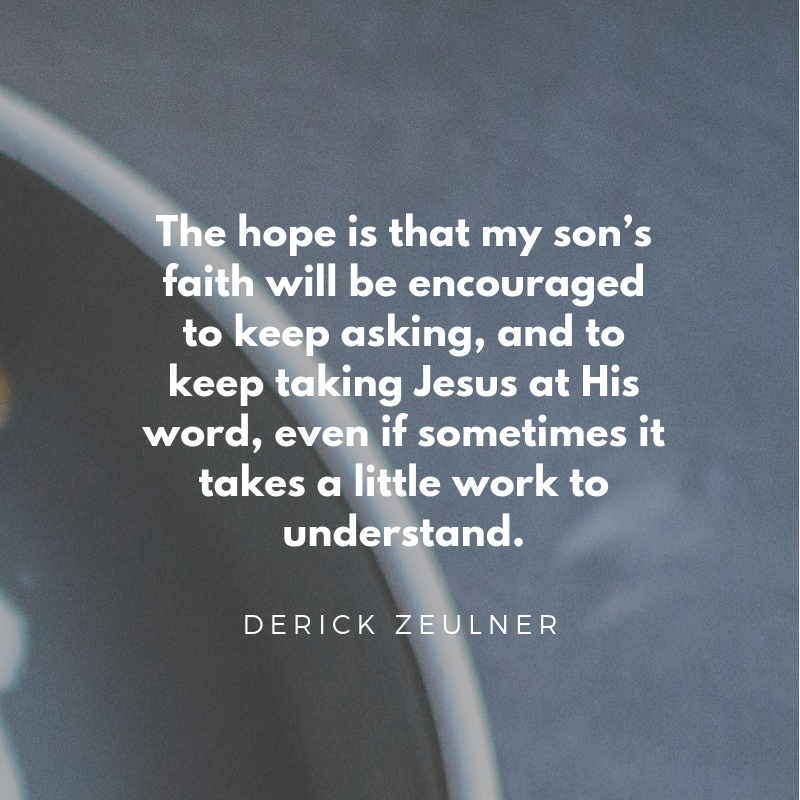"Jesus said It, but It Doesn't Work"
1“Jesus said, ‘Ask and it will be given to you; seek and you will find; knock and the door will be opened to you.’ But it doesn’t work. I’ve tried it and it doesn’t happen.”
It’s not a question for a theology class, or Sunday School, or following a sermon. It’s breakfast on a Wednesday, and between bites of egg my 8-year-old wants to know:
“So, if Jesus said it, why doesn’t it work?”
What do you say?

Seriously, what? Because in that moment you have the opportunity to help form your 8-year-old’s view of Jesus, the authority of Scripture, and the value of prayer.
Have you had this sort of scenario? Right in the middle of something else; totally unprepared for a question of this level of seriousness. Maybe it was a question about evil, or the Trinity, or some other difficult part of the Bible. What do you do?
Here are a few tips:
- Take a moment. Keep chewing those eggs and ask God to give you the wisdom to know what to say and how to say it – Jesus said that the Spirit was given so we’d have the right words to say in the right time (Luke 12:12) and I have to believe that it's not only in persecution, but even when our kids need answers.
- Affirm their question. Let them know, “That’s a good question.” Or “I’m so glad you asked that.” Or “thanks for sharing that question with me.” It is good for our kids (and for us) to know that questions about the Bible, Christian beliefs and God are all good things.
- Ask them questions. What might have sounded like a complex question attempting to invalidate the existence of God or the impossibility of the Trinity, might have been something far more simple or personal to them. In this scenario, my wife was the wise one to say, "What do you mean it hasn’t worked?" and "What kinds of things have you asked for?" It also doesn't hurt to see if they've already started working out the answer for themselves with a, "What do you think?"
- Take it to the Bible. In this particular breakfast scenario it was about understanding a specific text of scripture. So, my wife and I explained about the importance of context (She had this great illustration about telling the kids they could get anything they wanted at the dollar store, but not at Target because the context mattered). When we look at the rest of the paragraph in Matthew 7, Jesus gives us a picture of God as a good dad giving us good gifts – the things we need. This led to a discussion about what are good things that we need. "What if there are better things that God wants to give us, but in order to receive them we have to miss out on lesser things that we also think we need? The very next paragraph talked about finding the narrow path - would that be a good example of something to ask for, that God might be willing to give us?"

- Look at other texts. Sometimes the text you are looking at might be really hard to understand. Sometimes the same idea is taught elsewhere in a more straight forward way. Before we looked at Matthew 7 together I remembered a similar place where Jesus says, “If you abide in me and my words abide in you, ask whatever you wish and it will be given to you.” (John 15:7) This helped teach about context too. “Ask whatever you wish and it will be given to you” taken on its own lays out a promise that is big and easily proved wrong. However, when we understand what it means to abide in Christ, and have his words abiding in us, forming us and changing our desires to match up with Christ’s desires, we begin to see that the things we will ask for will look very different than simply a million dollars, a new toy or candy.
- Share some examples. Go the extra mile to make it plain to them in ways they can see. These examples can be from your life, your kids, history or the Bible. For this example, we talked about Jesus in the garden on the night of his betrayal, asking God to take away the cup of his suffering, but also praying “Not my will, but your will be done.” Did Jesus get what he asked for? Yes and no. Ultimately he did, because God's will was a higher priority to him than his comfort. Another example we discussed was from our recent trip to Cuba. There we saw and met Christians who sometimes were without food, but had learned to more fiercely depend on Jesus. So I asked my son if that was better or worse than someone who has all the food and toys and things they want in life, but has no sense of their need for Jesus? He was easily able to see the difference in what was most important.
- Finally, be willing to say, “I don’t know." But also add "It’s a great question and I want to find a good answer.” You don’t have to have all the answers, and admitting that you don’t will help your kids get a real picture of what it looks like to follow Christ. But, with that, actually work to find the answer and bring them in to the hunt too. Follow back up with them later and say, “remember when you asked that question? Well, I think I found out what it means.” We want to be a helpful resource for you at the church, as well as there are great websites and books to point you toward.
In the end, we had some good eggs (over-easy), and some great discussion (a little harder, but even tastier). It was an unexpected topic, but the hope is that my son’s faith will be encouraged to keep asking and keep taking Jesus at his word, even if sometimes it takes a little work to understand.

How about you? What have your kids asked you? And what have been helpful resources to find the answers you were looking for? Feel free to discuss in the comments or to take the discussion to our Facebook Group page.
----
Derick Zeulner is an associate pastor at South Shores Church. He has a M.A. in Theology from Talbot School of Theology in La Mirada, CA and he loves the wacky adventures of doing life with his wife, Rebecca, and 4 kids.
Leave a Comment
Comments for this post have been disabled.
More in South Shores Blog
December 9, 2022
Ukraine Updates December 2022March 9, 2022
Ukraine UpdatesOctober 13, 2021
All People. Everywhere: Unhindered
1 Comment
Joanne wilson Feb 16, 2019 @ 12:31 am